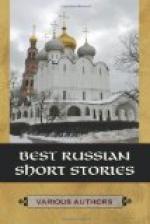And when they grabbed him by the shoulder and he rose, and they quickly led him through the garden where the cabbages raised their dry heads, he could not formulate a single thought.
He was conducted to the road and placed at the railing with his back to one of the iron bars. He fixed his spectacles, put his hands behind him, and stood there with his neat, stocky body, his head slightly inclined to one side.
At the last moment he looked in front of him and saw rifle barrels pointing at his head, chest and stomach, and pale faces with trembling lips. He distinctly saw how one barrel levelled at his forehead suddenly dropped.
Something strange and incomprehensible, as if no longer of this world, no longer earthly, passed through Andersen’s mind. He straightened himself to the full height of his short body and threw back his head in simple pride. A strange indistinct sense of cleanness, strength and pride filled his soul, and everything—the sun and the sky and the people and the field and death—seemed to him insignificant, remote and useless.
The bullets hit him in the chest, in the left eye, in the stomach, went through his clean coat buttoned all the way up. His glasses shivered into bits. He uttered a shriek, circled round, and fell with his face against one of the iron bars, his one remaining eye wide open. He clawed the ground with his outstretched hands as if trying to support himself.
The officer, who had turned green, rushed toward him, and senselessly thrust the revolver against his neck, and fired twice. Andersen stretched out on the ground.
The soldiers left quickly. But Andersen remained pressed flat to the ground. The index finger of his left hand continued to quiver for about ten seconds.
THE OUTRAGE—A TRUE STORY
BY ALEKSANDR I. KUPRIN
It was five o’clock on a July afternoon. The heat was terrible. The whole of the huge stone-built town breathed out heat like a glowing furnace. The glare of the white-walled house was insufferable. The asphalt pavements grew soft and burned the feet. The shadows of the acacias spread over the cobbled road, pitiful and weary. They too seemed hot. The sea, pale in the sunlight, lay heavy and immobile as one dead. Over the streets hung a white dust.




